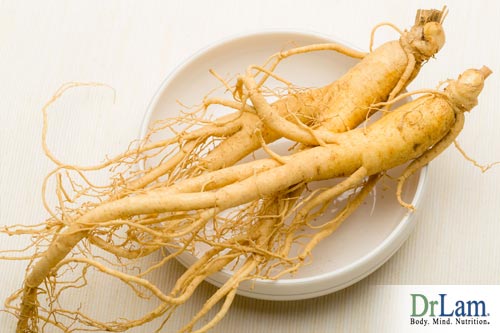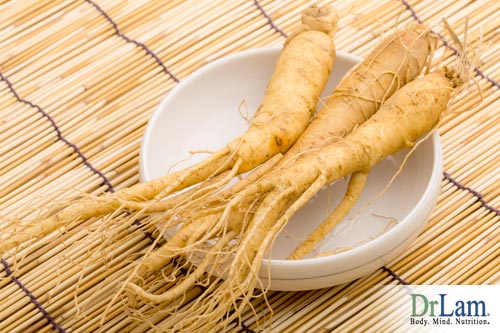 There are two main kinds of ginseng: Chinese or Korean (Panax ginseng) and Siberian (Eleutherococcus senticosus). For over 5,000 years, the Ginseng plant has been used to restore vitality, increase the feeling of energy, improve mental and physical performance, increase immunity, and reduce anxiety. Ginseng has the ability to serve as an adaptogen. Kings and emperors of the past have placed great emphasis on ginseng to fortify their health.
There are two main kinds of ginseng: Chinese or Korean (Panax ginseng) and Siberian (Eleutherococcus senticosus). For over 5,000 years, the Ginseng plant has been used to restore vitality, increase the feeling of energy, improve mental and physical performance, increase immunity, and reduce anxiety. Ginseng has the ability to serve as an adaptogen. Kings and emperors of the past have placed great emphasis on ginseng to fortify their health.
It appears to accomplish these goals by fine tuning the adrenal gland and reestablishing a proper cortisol level. Cortisol is a hormone secreted by the adrenal gland. More is secreted in times of stress or after a meal high in sugar. It is one hormone that increases with age rather than decreasing (as in growth hormone, DHEA, melatonin, estrogen, and testosterone). Excessive cortisol in your body is a leading pro-aging factor. For this reason, cortisol is also called the aging hormone. The exact mechanism of action of ginseng is still unknown, and will not be fully investigated for many years to come.
There are many types and grades of ginseng and ginseng extracts. Chinese ginseng tends to be the more potent form. Consider using Chinese ginseng if you have been under a great deal of stress, if you are recovering from an illness, or have been on corticosteroid drugs (such as prednisone) for a long time. Siberian ginseng works well if your stress is mild and your adrenal function is less affected.
The marketplace is full of many types and grades of ginseng and ginseng extracts. The quality is highly dependent on the source, age, parts of the root used, and the method of preparation. Due to the lack of FDA regulation and standardization, be weary of unsubstantiated claims and unscrupulous marketing schemes.
The ginseng plant can be eaten raw. The Koreans do it by cutting the root into small slices and dipping them into honey to dampen the bitterness before eating as an appetizer.
If you are shopping for ginseng plant extracts, choose only products that have been standardized for ginsenoside content. Generally, 100 mg of extract containing 5% of ginsenosides three times a day in the form of an oral tablet is sufficient. For milder support, use fluid extracts of Siberian ginseng at a dosage of 1 to 2 tsp one to three times a day, or the dry powdered extract at the dosage one to three times a day.
The response varies widely, and there is no guarantee of results. Start at lower doses and gradually increase the daily amount. If you take too much, side effects such as anxiety, irritability, nervousness, insomnia, hypertension, menstrual changes, and breast pain may arise. Should these problems develop, reduce your intake or discontinue using ginseng completely.
For the less adventurous, consider vitamin B12 (500 mcg to 1500 mcg) as an alternative or to be used concurrently to enhance the results of ginseng.
With ginseng’s effects on the adrenal glands and cortisol levels, it should be considered carefully when adrenal fatigue syndrome is present. Under significant and continuing stress, the body’s ability to release cortisol from the adrenal glands becomes diminished, possibly to the point of the adrenals not releasing the hormone. Cortisol is the body’s way of dealing with the effects of stress. If insufficient amounts are available to the body, stress begins creating sometimes severe symptoms.
 Traditional medicine often misses the importance of the role of cortisol. Instead, it may focus on separate symptoms rather than addressing the body’s systems in a coordinated and comprehensive manner. The NeuroEndoMetabolic model of stress response allows for the interaction of body systems when under stress. Insufficient cortisol due to adrenal fatigue may lead to increased inflammation and continuing damage to the body. Continuing inflammation can lead to more severe illness conditions.
Traditional medicine often misses the importance of the role of cortisol. Instead, it may focus on separate symptoms rather than addressing the body’s systems in a coordinated and comprehensive manner. The NeuroEndoMetabolic model of stress response allows for the interaction of body systems when under stress. Insufficient cortisol due to adrenal fatigue may lead to increased inflammation and continuing damage to the body. Continuing inflammation can lead to more severe illness conditions.
Adding ginseng to the body through food sources or good quality supplements can help in adjusting cortisol levels and fighting stress effects if one is mild AFS. Those in advanced stages of AFS may fare worse. Knowing your body and its state is critical prior to embarking on supplementation.
During significant stress and before adrenal fatigue, the adrenal glands secrete high levels of cortisol to fight the stress. These high levels of cortisol may lead to loss of healthy muscle and bone, slower healing, lower levels of other needed hormones, impaired metabolic function, and weaker immune functioning.
Ginseng can work to regulate cortisol levels, making these damaging results less likely. It acts like a thermostat on cortisol levels. In addition, ginseng supports adrenal health, helping these glands work more efficiently.
Some cautions regarding ginseng include: Be careful not to mix it with other stimulants. High doses of ginseng can lead to diarrhea and high blood pressure. Heart palpitations may occur if ginseng is taken when the person has heart problems. When taken within recommended doses, there are no significant side effects.
Ginseng can be helpful when you have early stages of AFS. When you have advanced stages of AFS, beware of products that have Ginseng.

